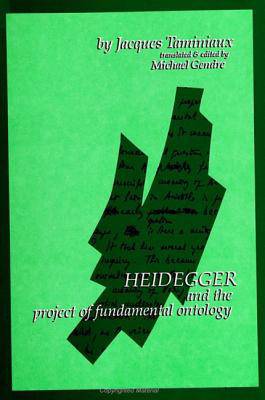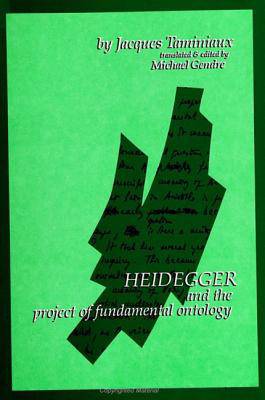
- Retrait gratuit dans votre magasin Club
- 7.000.000 titres dans notre catalogue
- Payer en toute sécurité
- Toujours un magasin près de chez vous
- Retrait gratuit dans votre magasin Club
- 7.000.0000 titres dans notre catalogue
- Payer en toute sécurité
- Toujours un magasin près de chez vous
Description
"It is by all means a dubious thing to depend and rest on what an author himself has brought to the forefront. The important thing is rather to give attention to those things he left shrouded in silence."
Such was the methodological advice, given in 1924 by Heidegger himself, that is rigorously followed in this book, Heidegger and the Project of Fundamental Ontology. The project involves the vast complex of problems that emerged around Being and Time (1927) and then continued from the time of the Marburg lecture courses (1923-1928) up to the Freiburg lectures (1928-1935), today available in the Gesamtausgabe.
Heidegger's silence concerning some of his foundational sources is a fact fully recognized by those who have carefully read him. This book systematically explores and critically assesses the silences concerning Husserl, the Aristotle of Book VI of the Nicomachean Ethics, the Hegel of Phenomenology, Nietzsche, and even Descartes.
What emerges is a systematic and original reinterpretation of 'fundamental ontology' focused on the self-understanding of the human Dasein as the key for understanding the various meanings of Being and the entire deconstructed history of ontology. The project culminated in the pretensions to absoluteness rampant in modern metaphysics, with its peak and paroxysm to be found in The Introduction to Metaphysics (1935).
In regard to the 'Heidegger affair', this book, which was begun well before the present turmoil, shows both the ambiguity and coherence of Heidegger's involvement with the Nazis, and, for the first time, exposes the work of the young Heidegger to a rigorous and wholesome internal criticism. By delineating the origins, the shifts, and the final outcome from within his own field, phenomenology, it allows us to reflect on this difficult question at its depth and origin.
Spécifications
Parties prenantes
- Auteur(s) :
- Traducteur(s):
- Editeur:
Contenu
- Nombre de pages :
- 233
- Langue:
- Anglais
- Collection :
Caractéristiques
- EAN:
- 9780791406854
- Date de parution :
- 19-09-91
- Format:
- Livre relié
- Format numérique:
- Genaaid
- Poids :
- 526 g

Les avis
Nous publions uniquement les avis qui respectent les conditions requises. Consultez nos conditions pour les avis.






